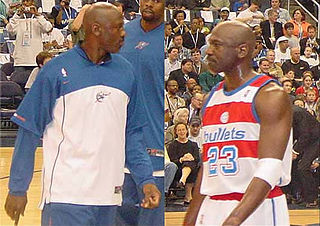Top Qs
Timeline
Chat
Perspective
2002–03 Washington Wizards season
NBA professional basketball team season From Wikipedia, the free encyclopedia
Remove ads
The 2002–03 NBA season was the Wizards' 42nd season in the National Basketball Association and the final one for basketball icon and future Hall of Famer Michael Jordan, who retired for the third and final time after its conclusion.[1]
Prior to the season, the Wizards acquired All-Star guard Jerry Stackhouse from the Detroit Pistons[2][3][4] and signed free agents Larry Hughes, Bryon Russell, and Charles Oakley.[5][6][7][8] Retired All-Star center Patrick Ewing was hired as the team's assistant coach.[9][10]
The Wizards got off to a promising 6–4 start, only to lose six straight games. They had a 24–25 record at the All-Star break.[11] The team finished fifth in the Atlantic Division with a 37–45 record, the same as the previous season.[12]
Jordan played his final game on April 16, 2003, a 107–87 loss to the Philadelphia 76ers on the road.[13][14][15][16] Jordan averaged 20.0 points, 6.1 rebounds, 3.8 assists and 1.5 steals per game. He took part in all 82 games, starting 67 of them.[17] The veteran guard also made his final All-Star appearance in the 2003 NBA All-Star Game in Atlanta.[18][19][20]
Following the season, Russell signed as a free agent with the Los Angeles Lakers, while Tyronn Lue signed with the Orlando Magic, Oakley was released to free agency and head coach Doug Collins was fired after two seasons.[21] (See 2002–03 Washington Wizards season#Regular season)
Remove ads
Offseason
NBA draft
Roster
Remove ads
Regular season
Summarize
Perspective

After Jordan announced he would return for the 2002–03 season, he was determined to be have reinforcements around him. He traded for All-Star Jerry Stackhouse and signed budding star Larry Hughes. Jordan even accepted a sixth-man role to prepare himself for the rigors of the 82-game grind. Still dealing with nagging knee issues, he came off from the bench in the first 15 games. However, a combination of injuries and uninspired play led to Jordan's return to the starting lineup, where he tried to put the team in playoff contention after a 6–9 start. The move led to mixed results, as several of Jordan's younger teammates complained about playing in his immense shadow and as well as what they perceived to be unfair expectations for them.[22]
By the end of the season, the Wizards finished with a 37–45 record once again. At the age of 40, Jordan ended the season as the only Wizard to play in all 82 games. He averaged 20.0 points, 6.1 rebounds, 3.8 assists, and 1.5 steals in 37.0 minutes per game. He also became the only 40-year-old in NBA history to score over 40 points in a game,[23] which he did several times during the season.[24] In addition, Jordan became the oldest NBA player in NBA history to average at least 20 points at the age of 40.[25] This was also the first season in which Jordan was not his team's high scorer, as Stackhouse averaged 21.5 per game. Jordan paced the team in steals (1.5 per game), while Christian Laettner led the team in rebounds (6.6), Stackhouse in assists (4.5) and Brendan Haywood in blocked shots (1.5).[17]
After the season, Wizards' majority owner Abe Pollin fired Jordan as team president, much to the shock of teammates, associates and fans alike. Jordan felt he was betrayed, thinking that he would get his ownership back after his playing days ended, but Pollin justified Jordan's dismissal by noting that Jordan had detrimental effects on the team, such as benching Larry Hughes for Tyronn Lue, making poor trades, and squandering the teams' first round pick at the 2001 NBA draft on high schooler Kwame Brown who never panned out. Despite the signing of future All-Star point guard Gilbert Arenas the team stumbled to a 25–57 record in the 2003–04 season.
Jordan's stint with the Wizards was closely watched by both fans and the media. While the team failed to qualify for the playoffs in either of Jordan's two seasons as a player, despite the Wizards not being in the upper tiers of NBA standings, the team sold-out arenas around the league.[26] The Wizards replaced Jordan's managerial role with general manager Ernie Grunfeld. Although the organization fielded a competitive team built around Arenas for several years, the team again stumbled into the lower echelon of the league in the years following Arenas' numerous off-the-court issues.
Record vs. opponents
Remove ads
Player statistics
| GP | Games played | GS | Games started | MPG | Minutes per game |
| FG% | Field-goal percentage | 3P% | 3-point field-goal percentage | FT% | Free-throw percentage |
| RPG | Rebounds per game | APG | Assists per game | SPG | Steals per game |
| BPG | Blocks per game | PPG | Points per game |
Regular season
- † Denotes player spent time with another team in the season. Stats reflect time with the Wizards only.
Remove ads
Award winners
- All-Star: Michael Jordan (14th)
References
Wikiwand - on
Seamless Wikipedia browsing. On steroids.
Remove ads